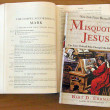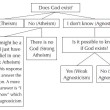The Bible and the Question of Miracles: Towards a Christian Response
by Dr. Matthew Ramage
Filed under The Bible

My previous post at Strange Notions underscored the often-unacknowledged philosophical premises at work when believers and non-believers sit down to debate about things biblical. In the course of my argument, I pointed to a possible area of common ground for Catholics and agnostics/atheists. A survey of statements by thinkers as different as Benedict XVI and Bart Ehrman reveals an important agreement upon the reality that everyone carries their own philosophical presuppositions and that... Read More
Bart Ehrman, Benedict XVI, and the Bible on the Question of Miracles
by Dr. Matthew Ramage
Filed under The Bible

“At its core, the debate about modern exegesis is not a dispute among historians: it is rather a philosophical debate.” - Joseph Ratzinger (Pope Benedict XVI) My reflection today revolves around this poignant line from Joseph Ratzinger’s 1988 Erasmus Lecture in which he famously called for a “criticism of criticism.” In penning these words, the German cardinal was looking for a self-criticism of the modern, historical-critical method of biblical interpretation. On the part of... Read More
Does Evolution Contradict Genesis?
by Matt Fradd
Filed under Evolution, The Bible

The theory of evolution proposes an explanation for how life in general and mankind in particular arose. It holds that that there was a long period in which natural processes gave rise to life and to the different life forms on earth. This in no way conflicts with the idea of God. As the omnipotent Creator, he is free to create either quickly or slowly and either directly or through intermediate processes that he sets up. He can even do a mixture of these things, such as creating the universe... Read More
The Gods of Israel: Does the Bible Promote Polytheism?
by Dr. Matthew Ramage
Filed under The Bible

“What great nation is there that has a god so near to it as the LORD our God is to us, whenever we call upon him?” This passage from the Book of Deuteronomy was recently proclaimed in the Catholic Church’s Lenten liturgy, and it touched right at the heart of something I have been pondering for some time: evidence of polytheism in the Bible and the relationship between ancient Israelite and Canaanite religious traditions. Popular critics of the Judeo-Christian God frequently focus... Read More
Is God Pro-Life or Pro-Death?
by Dr. Matthew Ramage
Filed under Christianity and Violence, The Bible, The Problem of Evil

This is the second in a series of posts on the “dark passages” of the Bible. These are texts which understandably raise the eyebrows of both nonbelievers and believers who encounter them and say, “How can that be in the Bible if it is God’s own word?” In my previous post I took up the problem of violent Old Testament passages in light of Pope Benedict XVI’s claim that violence is contrary to God’s nature. My book Dark Passages of the Bible likewise deals with this and various... Read More
Violence is Contrary to God’s Nature: Common Ground for Catholics and Atheists
by Dr. Matthew Ramage
Filed under Christianity and Violence, The Bible

Today I’d like to consider an issue on which many atheists and Catholics may—perhaps to their surprise—find a point of common ground. “Violence is incompatible with the nature of God.” This line is not from an atheist but rather from Pope Benedict XVI. The context in which he penned it was his famous (in some circles infamous) Regensburg Address from 2006. In this particular case, he was endeavoring to foster a dialogue with Islam over a theology which “might even lead to... Read More
Myths, Lies, or Truth: Can We Really Trust the Gospels?
by Carl Olson
Filed under The Bible

January 11, 49 B.C. is one of the most famous dates in the history of ancient Rome, even of the ancient world. On that date Julius Caesar crossed the Rubicon River, committing himself and his followers to civil war. Few, if any, historians doubt that the event happened. On the other hand, numerous skeptics claim that the Gospels of Matthew, Mark, Luke, and John are myth and have no basis in historical fact. Yet, as historian Paul Merkley pointed out two decades ago in his article, "The... Read More
What Faith Is and What it Isn’t
by Bishop Robert Barron
Filed under Faith

The Protestant theologian Paul Tillich once commented that “faith” is the most misunderstood word in the religious vocabulary. I’m increasingly convinced that he was right about this. The ground for my conviction is the absolutely steady reiteration on my Internet forums of gross caricatures of what serious believers mean by faith. Again and again, my agnostic, atheist, and secularist interlocutors tell me that faith is credulity, naïvete, superstition, assent to irrational nonsense,... Read More
Is Atheism a Belief or a Lack of Belief?
by Trent Horn
Filed under Atheism

When asked to prove atheism is true, many atheists say that they don’t have to prove anything. They say atheism is not “belief there is no God” but merely “no belief in a God.” Atheism is defined in this context as a “lack of belief” in God, and if Catholics can’t prove God exists, then a person is justified in being an atheist. But the problem with defining atheism as simply “the lack of belief in God” is that there are already another group of people who fall under... Read More
How Music Led Me to God
by Jennifer Fulwiler
Filed under Conversion, Music

A while back I mentioned to an atheist acquaintance that I'd cried at Mass that morning. I explained that it was one of those times when I felt overwhelmed with the presence of God; I was so perfectly at peace, so surrounded by love, that I couldn't help but be moved to tears. "Maybe it was the music," he responded. He went on to offer an erudite analysis of how music is known to produce certain positive sensations in the brain, noting that religious leaders from time immemorial have used... Read More






